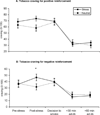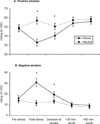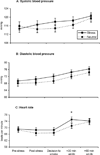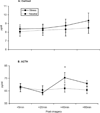Stress decreases the ability to resist smoking and potentiates smoking intensity and reward
- PMID: 20817750
- PMCID: PMC3637660
- DOI: 10.1177/0269881110376694
Stress decreases the ability to resist smoking and potentiates smoking intensity and reward
Abstract
We have developed a novel human laboratory model to examine two primary aspects of stress-precipitated tobacco relapse: (1) Does stress reduce the ability to resist the first cigarette? (2) Once the first cigarette is initiated, does stress facilitate subsequent smoking? Using a within-subject design, daily smokers (n = 37) who were nicotine deprived overnight received a personalized imagery induction (stress or neutral) on two separate days, and then had the option of initiating a tobacco self-administration session or delaying initiation for up to 50 min in exchange for three levels of monetary reinforcement. Subsequently, the tobacco self-administration session entailed a 1-hour period in which subjects could choose to smoke using a smoking topography system. Following the stress induction, subjects were less able to resist smoking, smoked more intensely (increased puffs, shorter inter-puff interval, and greater peak puff velocity), and perceived greater satisfaction and reward from smoking. Stress significantly increased hypothalamus-pituitary-adrenal (HPA) axis reactivity, tobacco craving, negative emotion, and physiologic reactivity relative to the neutral condition. In addition, increased cortisol, ACTH, and tobacco craving were associated with reduced ability to resist smoking following stress. These findings have implications for understanding the impact of stress on smoking relapse and model development to assess smoking lapse behavior.
Conflict of interest statement
All other authors declare that they have no conflicts of interest.
Figures






Similar articles
-
Developing a laboratory model of smoking lapse targeting stress and brief nicotine deprivation.Exp Clin Psychopharmacol. 2018 Jun;26(3):244-250. doi: 10.1037/pha0000187. Exp Clin Psychopharmacol. 2018. PMID: 29863382 Free PMC article.
-
Modeling the effect of alcohol on smoking lapse behavior.Psychopharmacology (Berl). 2006 Dec;189(2):201-10. doi: 10.1007/s00213-006-0551-8. Epub 2006 Sep 30. Psychopharmacology (Berl). 2006. PMID: 17013640 Free PMC article. Clinical Trial.
-
Nicotine and food deprivation decrease the ability to resist smoking.Psychopharmacology (Berl). 2010 Sep;212(1):25-32. doi: 10.1007/s00213-010-1902-z. Epub 2010 Jun 29. Psychopharmacology (Berl). 2010. PMID: 20585761 Free PMC article. Clinical Trial.
-
Developing human laboratory models of smoking lapse behavior for medication screening.Addict Biol. 2009 Jan;14(1):99-107. doi: 10.1111/j.1369-1600.2008.00135.x. Epub 2008 Oct 9. Addict Biol. 2009. PMID: 18855800 Free PMC article. Review.
-
Biological mechanisms underlying the relationship between stress and smoking: state of the science and directions for future work.Biol Psychol. 2011 Sep;88(1):1-12. doi: 10.1016/j.biopsycho.2011.06.009. Epub 2011 Jul 7. Biol Psychol. 2011. PMID: 21741435 Free PMC article. Review.
Cited by
-
Effects of nicotine on social cognition, social competence and self-reported stress in schizophrenia patients and healthy controls.Eur Arch Psychiatry Clin Neurosci. 2013 Sep;263(6):519-27. doi: 10.1007/s00406-012-0377-9. Epub 2012 Oct 19. Eur Arch Psychiatry Clin Neurosci. 2013. PMID: 23081705 Clinical Trial.
-
Modeling the effects of positive and negative mood on the ability to resist eating in obese and non-obese individuals.Eat Behav. 2013 Jan;14(1):40-6. doi: 10.1016/j.eatbeh.2012.10.010. Epub 2012 Oct 31. Eat Behav. 2013. PMID: 23265400 Free PMC article.
-
Life adversity is associated with smoking relapse after a quit attempt.Addict Behav. 2016 Sep;60:71-7. doi: 10.1016/j.addbeh.2016.03.017. Epub 2016 Apr 6. Addict Behav. 2016. PMID: 27100471 Free PMC article.
-
Response to nicotine following overnight smoking abstinence during short-term progesterone treatment in women.Exp Clin Psychopharmacol. 2020 Jun;28(3):306-316. doi: 10.1037/pha0000312. Epub 2019 Aug 29. Exp Clin Psychopharmacol. 2020. PMID: 31464476 Free PMC article.
-
Smoking-related knowledge, attitudes, and behaviors among Alaska Native people: a population-based study.Int J Circumpolar Health. 2013 Aug 5;72. doi: 10.3402/ijch.v72i0.21141. eCollection 2013. Int J Circumpolar Health. 2013. PMID: 23984275 Free PMC article.
References
-
- al’Absi M, Hatsukami D, David GL. Attenuated adrenocorticotropic responses to psychological stress are associated with early smoking relapse. Psychopharmacol. 2005;181:107–117. - PubMed
-
- al’Absi M, Willmers LE, Erickson J, Hatsukami D, Crouse B. Attenuated adrenocortical and blood pressure responses to psychological stress in ad libitum and abstinent smokers. Pharmacol Biochem Behav. 2003;74:401–410. - PubMed
-
- Arnsten AFT. Catecholamine modulation of prefrontal cortical cognitive function. Trends Cognit Sci. 1998;2:436–447. - PubMed
-
- Baer JS, Lichenstein E. Classification and prediction of smoking relapse episodes: An exploration of individual differences. J Consult Clin Psychol. 1988;56:104–110. - PubMed
Publication types
MeSH terms
Substances
Grants and funding
- UL1 RR024139/RR/NCRR NIH HHS/United States
- T32AA015496/AA/NIAAA NIH HHS/United States
- K12DA000167/DA/NIDA NIH HHS/United States
- T32 AA015496/AA/NIAAA NIH HHS/United States
- UL1DE019586/DE/NIDCR NIH HHS/United States
- UL1 DE019586/DE/NIDCR NIH HHS/United States
- K12 DA000167/DA/NIDA NIH HHS/United States
- R21 DA017234/DA/NIDA NIH HHS/United States
- RL1 DA024857/DA/NIDA NIH HHS/United States
- PL1DA024860/DA/NIDA NIH HHS/United States
- RL1DA024857/DA/NIDA NIH HHS/United States
- PL1DA024859/DA/NIDA NIH HHS/United States
- R21DA017234/DA/NIDA NIH HHS/United States
- PL1 DA024860/DA/NIDA NIH HHS/United States
- PL1 DA024859/DA/NIDA NIH HHS/United States
LinkOut - more resources
Full Text Sources
Medical

